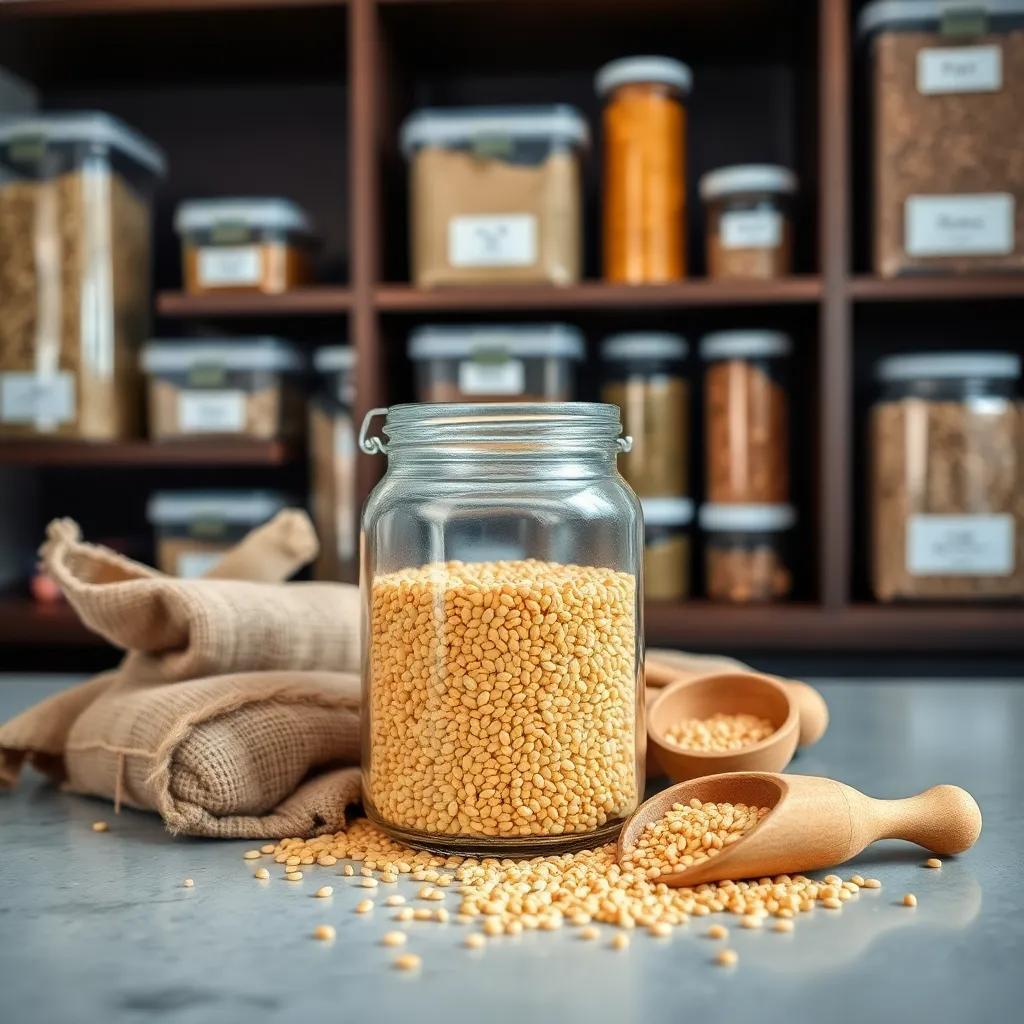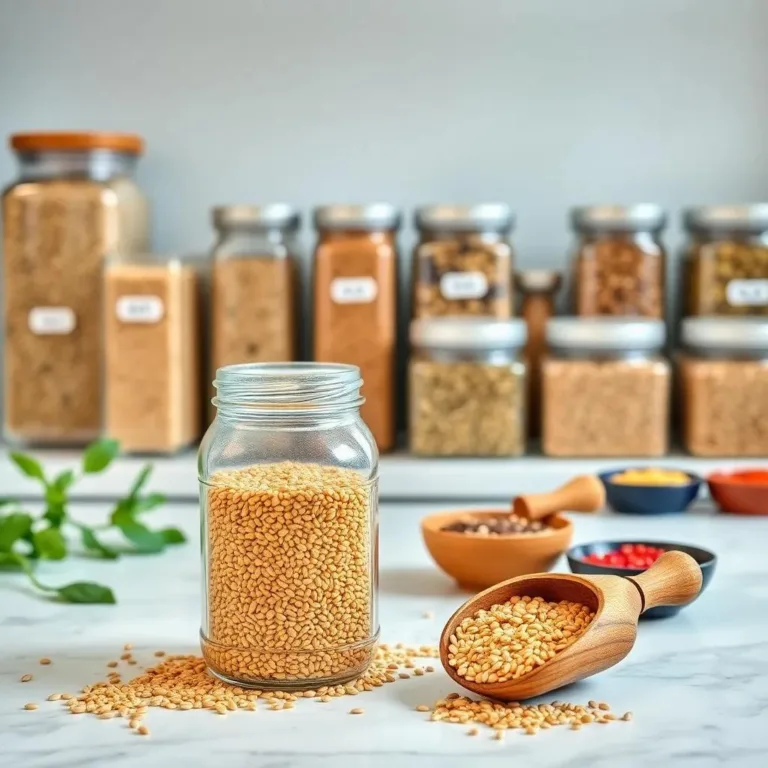Hey there, sesame seed enthusiasts! Have you ever wondered how long those tiny seeds can stay fresh and tasty? Join me as we explore the shelf life of sesame seeds, how to store them properly, and the sneaky signs that tell you when they’ve gone bad! Let’s unlock the secrets to keeping your sesame seeds in tip-top shape for all your delicious recipes!
Factors Influencing Sesame Seed Shelf Life
When it comes to the shelf life of sesame seeds, several factors play a role. Understanding these can help you keep your seeds fresh and tasty! So, let’s break it down together!
- Moisture Content:
Sesame seeds contain natural oils, which can go rancid if they absorb too much moisture. If they’re stored in a humid place, you might find mold growing on them or a funky odor. Keeping them in a dry space is key to maintaining their quality!
- Temperature:
The heat can be a real enemy for our beloved sesame seeds! Extreme temperatures can cause the oils to oxidize, leading to a loss of flavor and nutrients. Store your seeds in a cool spot—like a pantry or kitchen cabinet—away from direct sunlight. Your seeds will thank you!
- Packaging Matters:
The way you package your sesame seeds can either help them live long and prosper or make them spoil faster. Using airtight containers like glass jars or resealable bags prevents air, moisture, and pests from wreaking havoc on your seeds. So, always seal them up tight!
- Quality of Seeds:
Not all sesame seeds are created equal! The initial quality can affect how long they last. When buying, go for reputable suppliers and check the packaging date. Fresh seeds are your best bet for a longer shelf life!
- Processing Methods:
How the seeds are processed can change their longevity too! Roasting or toasting them can affect their moisture content and oil stability. If you love roasted seeds, just know they may have a shorter shelf life than raw ones!
By keeping these factors in check, you can make informed choices about storing and enjoying your sesame seeds!
Best Storage Practices for Sesame Seeds
Now that we know about the factors affecting our sesame seeds, let’s talk about how to store them properly. Good storage practices are your best friends when it comes to keeping those little seeds fresh and flavorful! Here are some tips that I personally swear by:
- Choose the Right Containers:
Invest in airtight containers! Glass jars and resealable bags are fantastic choices. Make sure they’re clean and dry before you toss your seeds inside. A well-sealed container can make all the difference!
- Cool and Dark Locations:
Find a place in your kitchen that’s away from heat and light. A pantry works wonders! Keeping them in a cool, dark spot helps prevent the oils from going rancid—yikes!
- Avoid Moisture:
Keep moisture at bay! Store your seeds in a dry area. If you live in a humid climate, consider putting them in the refrigerator! Just be sure to seal them tightly to prevent moisture from sneaking in.
- Limit Air Exposure:
Air is not our friend when it comes to sesame seeds. Try to open the container only when you need some seeds. This way, they’ll stay fresh longer.
- Stay Away from Strong Odors:
Sesame seeds can absorb smells like a sponge. Keep them away from pungent foods like garlic or spices. No one wants their seeds tasting like last week’s leftovers!
- Label and Date:
If you’re like me and love to stock up on seeds, labeling and dating your containers can help. This way, you’ll use the oldest seeds first and minimize waste.
By following these simple practices, you can maximize the freshness of your sesame seeds and enjoy their delightful crunch in your dishes! Happy storing!

Signs Your Sesame Seeds Have Spoiled
It’s important to keep an eye on your sesame seeds! While they can last for quite a while, they can also spoil if not stored properly. I’ve learned a few telltale signs that help me determine when it’s time to toss them out. Let’s check them out together!
- Rancid Smell:
One of the first things I notice is the smell. Fresh sesame seeds have a lovely, nutty aroma. If you catch a whiff of something unpleasant or rancid, it’s an immediate sign that the seeds are past their prime! Don’t risk your health—time to say goodbye!
- Off-Color or Mold Growth:
Give your sesame seeds a good look. If you see any discoloration, like dark spots or a greenish tinge, it’s time to toss them. Mold is a definite no-go, so be vigilant! Nobody wants to consume moldy seeds!
- Change in Texture:
Fresh sesame seeds should feel crisp and crunchy. If they start to feel slimy or mushy, that’s a clear indicator that they’ve spoiled. Trust me, no one wants to bite into a mushy seed!
- Bitter Taste:
While sesame seeds have a natural slight bitterness, if it becomes overwhelming or turns unpleasant, throw them out. A strong, bitter taste means they’ve likely gone bad!
- Check the Expiry Date:
Always look at the packaging date when you buy sesame seeds. If they’re past their expiry date, they’ve probably lost their freshness and quality. It’s better to be safe than sorry!
By keeping these signs in mind, you’ll know when to part ways with your sesame seeds and avoid any unpleasant surprises in your dishes!
How to Extend the Shelf Life of Sesame Seeds
Now that we’ve covered how to spot spoiled sesame seeds, let’s talk about how to keep our seeds fresh for as long as possible! These handy tips will help you store them like a pro!
- Buy Fresh Seeds:
Start with fresh sesame seeds from a reliable store. Check the packaging date before you toss them into your cart. Fresh seeds can last much longer compared to older ones!
- Refrigerate Them:
If you live in a warm or humid area, consider putting your sesame seeds in the refrigerator. This cooling method can significantly slow down the oxidation process, keeping them fresh and delicious for an extended time!
- Vacuum Sealing:
If you have a vacuum sealer, now’s a great time to use it! Vacuum-sealed bags can help minimize exposure to air, making a big difference in preserving freshness and flavor. Who doesn’t love that?
- Freezing for Longevity:
If you want to store sesame seeds for an even longer duration, try freezing them! Put them in an airtight container or freezer bag, and they can last up to a year! Just remember to thaw them at room temperature before using.
- Use Oxygen Absorbers:
For those who really want to keep their seeds fresh, consider using oxygen absorbers. These little packets help remove excess oxygen, which slows down the spoilage process. It’s like giving your seeds a little extra protection!
- Grind as Needed:
If you like using ground sesame seeds, only grind what you need! Whole seeds usually have a longer shelf life than ground ones, so keep them intact until you’re ready to use them!
- Regularly Check for Spoilage:
Make it a routine to check your sesame seeds every so often. A quick look will help you catch any spoilage before it becomes a bigger problem!
With these tips in your back pocket, you’ll be able to enjoy your sesame seeds’ delightful taste and nutrition for much longer! Your culinary adventures await!
Frequently Asked Questions About Sesame Seeds
I know you might have some questions about sesame seeds! Here are some common ones I’ve collected, along with my friendly answers to help clear things up!
What is the best way to store sesame seeds to keep them fresh?
The best way to store sesame seeds is in an airtight container placed in a cool, dark area, like a pantry. This practice helps protect them from moisture, air, and light!
Can sesame seeds go bad?
Absolutely! If not stored properly, sesame seeds can become rancid over time, leading to a bad taste and aroma. It’s best to keep an eye on them!
How long do sesame seeds typically last?
When stored correctly, sesame seeds can last between 6 months to a year. Always check the packaging for the expiration date and use them within that timeframe for the best flavor!
What are some signs that sesame seeds have gone bad?
Look out for a rancid smell, odd colors, mold growth, a change in texture, or a bitter taste. These signs will help you identify spoiled seeds quickly!
Can you freeze sesame seeds to make them last longer?
Yes! Freezing sesame seeds is an excellent way to extend their shelf life. Just make sure they’re in an airtight container, and they can last up to a year in the freezer!
I hope these answers help you navigate the sesame seed world with confidence! Enjoy experimenting with these tiny nutritional powerhouses!

